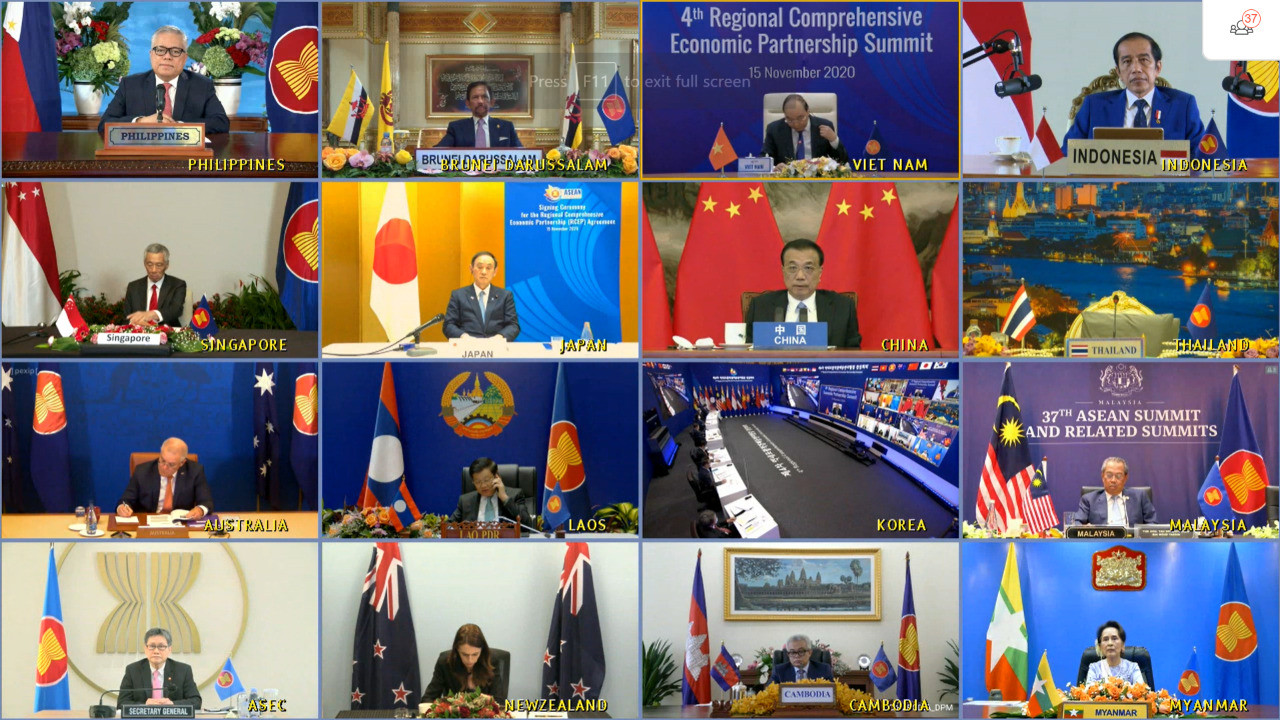Popular Reads
Top Results
Can't find what you're looking for?
View all search resultsPopular Reads
Top Results
Can't find what you're looking for?
View all search resultsIndonesia banks on RCEP for reduced uncertainty in trade
The RCEP, which represents nearly one-third of the global economy, is expected to grow the Indonesian economy by 0.05 percent between 2021 and 2032, according to an estimate from the Finance Ministry’s Fiscal Policy Agency.
Change text size
Gift Premium Articles
to Anyone
T
he Indonesian government is expecting the newly signed Regional Comprehensive Economic Partnership (RCEP) to help overcome uncertainty in global trade and prop up recovery from the pandemic-induced downturn.
Ten country members of the Association of Southeast Asian Nations, as well as Australia, China, Japan, South Korea and New Zealand, signed on Sunday the agreement during the fourth RCEP Summit, held online on the sidelines of the ASEAN Summit — around eight years after negotiations were first launched.
The deal aims to progressively lower tariffs across various areas in the coming years.
“This signing signals that our commitment to multilateralism remains strong,” President Joko “Jokowi” Widodo said in a statement on Sunday.
The RCEP, which represents nearly one-third of the global economy, is expected to grow the Indonesian economy by 0.05 percent between 2021 and 2032, according to an estimate from the Finance Ministry’s Fiscal Policy Agency.
Last year, the participating countries collectively accounted for 61.6 percent of Indonesia’s overall exports and 71.3 percent of overall imports, according to the Trade Ministry.
The RCEP, the world’s largest free trade agreement (FTA), was necessary as global trade faced challenges from trade tensions between the United States and China, waning confidence in the World Trade Organization (WTO), increased competition in new markets and rises in protectionism, said Trade Minister Agus Suparmanto.
“In this situation, it is clearly difficult for Indonesia to maximize its economic potential by boosting exports and attracting investment. We hope the RCEP can be the answer in overcoming it,” Agus told a virtual press conference on Sunday.
“In this context, we believe the RCEP will build hope in a faster economic recovery, at least in the RCEP region itself."
With the COVID-19 pandemic disrupting global trade, the WTO is expecting the volume of global trade in goods to contract 9.2 percent this year, less severe than the 12.9 percent decline outlined in the optimistic scenario of its April forecast.
The comprehensive trade agreement, which consists of 20 chapters and 14,367 pages, covers not only trade in goods, but also in financial, telecommunications and professional services.
It also comprises provisions on the temporary movement of natural persons, investment, government procurement, e-commerce and small and medium enterprises.
With more market access under the trade deal, Indonesia seeks to promote plant-based fiber, paper, chemical, rubber, plastic, mineral, metal, electricity, gas, wood and food products within the global value chain (GVC), according to Iman Pambagyo, the director general of international trade negotiations at the Trade Ministry.
“The key to reaping the benefits of the RCEP is to keep having reforms and policy adjustments that improve our ease of doing business,” said Iman, who served as the head of the RCEP trade negotiating committee.
“Second, we have to see the services sector as a ‘lubricant’ to bolster the growth of other sectors, including manufacturing.”
The government would now prepare the translated text and forward it to the President and the House of Representatives to start the ratification process, Iman said.
The RCEP will enter into force once six ASEAN member states and three of its partners have ratified it.
While the trade pact might result in US$1.52 billion worth of welfare gain, it is also estimated to raise Indonesia’s trade deficits with the participating countries by $491.46 million, according to Iman, quoting a 2016 study by the ministry.
Since 2012, Indonesia has seen persistent trade deficits with RCEP countries, with a total deficit standing at $19.2 billion last year, according to BKF.
Thus, the government is planning measures to mitigate potential challenges to the Indonesian textile, footwear, automotive, telecommunications, information and technology industries.
Mohammad Faisal, the executive director of the Center for Reform on Economics (CORE) Indonesia, said Sunday that the government should prepare a strategy to maximize trade and investment opportunities from the RCEP.
“The government often introduces only the agreement and the opportunities, but not the strategy on how to benefit from it,” Faisal told The Jakarta Post in a phone interview.
“Based on our experience, more often than not it leaves us with more challenges,” he added, referring to Indonesia’s widening trade deficit with China.
Although it would bring about new trade opportunities, the RCEP was not expected to significantly raise Indonesian exports to and imports from the participating countries since tariffs among them were already low, said Yose Rizal Damuri, the head of the economics department at the Centre for Strategic and International Studies (CSIS).
“But the RCEP can bolster Indonesia’s development and participation in the GVC,” Yose said on Friday.
“This will be very important for investors in the GVC, especially as people keep talking about diversification in the GVC or what we call relocation during this pandemic, especially out of China.”










